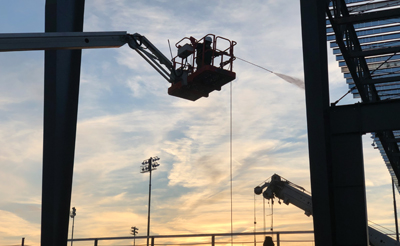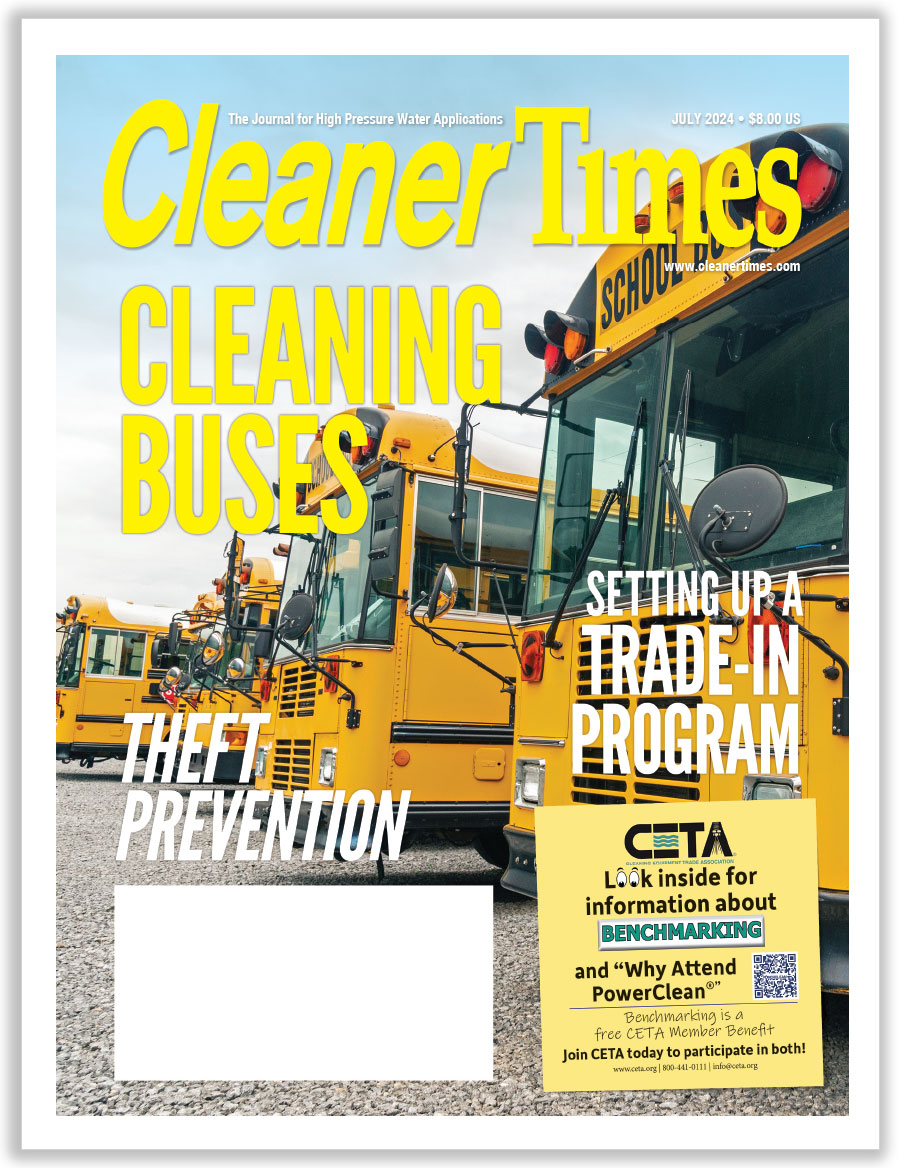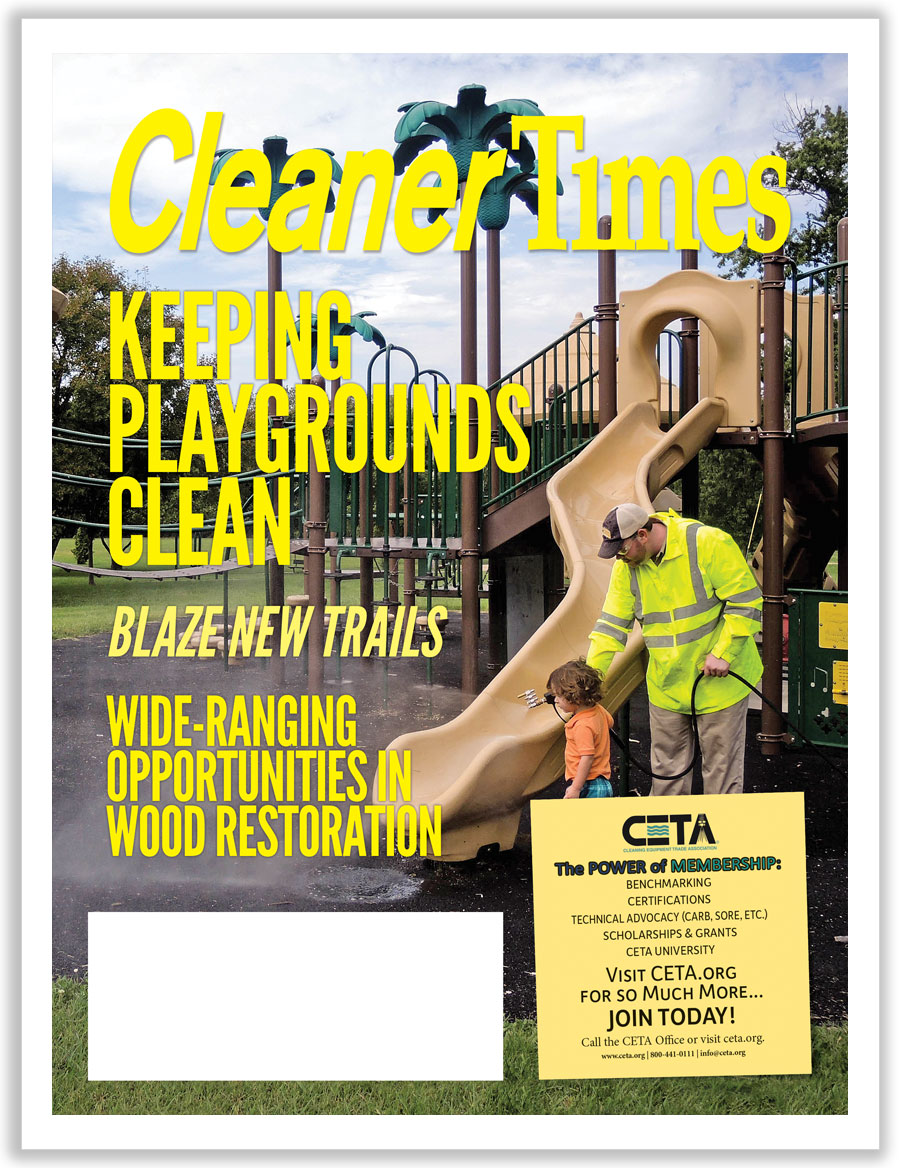
Cleaning Coast to Coast
Pressure Washing in Kansas — The “Sunflower State,” Renowned for Wheat Production and Wild Weather
by Terri Perrin / Published October 2023

Editor’s Note: This is part of a series of state profiles highlighting the opportunities, advantages, and challenges of the pressure washing industry across the USA. To read about opportunities in a specific state, as the series is updated, or to read past state profiles, please visit www.cleanertimes.com/cleaning-coast-to-coast.
A Bit of History
Kansas (KS) is unique in that it is almost exactly in the center of America and is equidistant from the Pacific and Atlantic oceans. This landlocked state is bordered by Nebraska to the north, Missouri to the east, Oklahoma to the south, and Colorado to the west. The name “Kansas” loosely translates in the Sioux language as “south wind people.” The state was so named after the Kansas or Kanza tribe of the Sioux nation people that lived in the area at the time.
Today Kansas is home to many diverse industries, with the agricultural sector, in particular, thriving. It’s a great state to grow crops and to grow any business related to the pressure washing industry. That said, the agricultural sector isn’t the only game in town. Kansas also boasts a thriving mining industry, renewable energy, trucking, construction, manufacturing, and much more.
Kansas By The Numbers
The population of Kansas neared three million in 2020, earning it the distinction of being the 35th most populous state in America. It’s the 15th largest state by size, measuring 82,277 square miles (213,096 km²).
Wheat production in Kansas is king, earning it the title of the “Wheat State” or the “Breadbasket of the World.” It’s estimated that Kansas produces over 300 million bushels of wheat annually, which accounts for more than 18 percent of the country’s production.
One fact to know about this region is that there are two towns named Kansas City—one in Missouri (MO) and one in Kansas. The journey between the two municipalities that share the same name takes about two minutes, a distance of 2,541 feet, as the “twin” cities are located right on the Missouri/Kansas border. Of the two, the one in Missouri is the largest.
The twin cities can cause some challenges to companies located on one side and wanting to do business on the other. “We had to subscribe to a payroll system to be able to pay our employees’ Kansas income taxes and the Missouri payroll taxes,” explains Jake Taylor, owner of Curb Appeal Power Wash, headquartered in the state capital of Topeka, KS. “Even though our home office is in Kansas, since we are mobile, income taxes are based on the location of the work site for the state. So, our techs get two W-2s and have to file taxes in both states. Also, sales taxes are paid for commercial fleets since they are mobile, so we pay sales tax on fleet washing to the state they are located in when we wash them.”
Also, when shipping products or providing services to “Kansas City,” it’s imperative that you confirm exactly which Kansas City the customer is talking about.
Another area that gets confusing tax wise is the southeast corner of the state. Doing business in the “four-state” area that includes Kansas, Missouri, Oklahoma, and Arkansas requires that you file taxes in all four states.
Power Washing Opportunities
Kansas is home to many power washing service providers and a handful of distributors. Landan Williams is VP and sales manager of Hy-Flo Equipment in Pittsburg, KS. The company sells and services its own private label brand of pressure washing equipment, which is manufactured by Alkota. Williams also operates his own pressure washing company, American Power Wash.
“Hy-Flo is a third-generation business that was founded by my grandfather, Ron Williams, in 1977,” Landan Williams proudly states. “We’re based in Pittsburg, KS, and with a fleet of six fully customized sales and service trucks, we service areas within a 200-mile radius of our warehouse.” (Note: Ron Williams was an active member of CETA for many years and was well-respected in the industry. He passed away in late July 2023, leaving behind a legacy that built a strong bond and trust with all his customers and which is being championed by the next generations: his son, Myland; grandsons, Landan and Chandler; and the entire Hy-Flo team.)
“The agricultural sector is by far our biggest market and represents about 50 percent of our business,” explains Williams. “Row crops, such as cereal grains, beans, corn, etc., are the mainstays. This is followed by cattle, poultry, and hog production. We also have large commercial dog kennels. These industries support equipment dealerships like John Deere, Kubota, and New Holland, to name a few, all of which need to keep their equipment clean. To promote our products and services to the agricultural market, we attend about five tradeshows each year. This has proven to be an excellent way to keep connected to the sector.”
While agriculture is big, it is also an ever-changing sector. Many of the farms were initially run by homesteaders. There is not as much enthusiasm for farming from the younger generation as there used to be; as a result farms today are larger and becoming corporately owned, and many will have their own cleaning equipment.

BIG BRUTUS
Big Brutus is the nickname of the Bucyrus-Erie model 1850-B electric shovel, which was the second largest of its type in operation in the 1960s and 1970s … and even though it is no longer in service, it needs to be cleaned on occasion! A BIG tourist attraction (pardon the pun!), Big Brutus is the centerpiece of a mining museum in West Mineral, KS, where it was used in coal strip mining operations. The shovel was designed to dig from 20 to 69 feet (6.1 to 21.0 m) down to unearth relatively shallow coal seams, which would themselves be mined with smaller equipment. (Photo courtesy of Hy-Flo Equipment.)
Williams continues, “Then, of course, there are feed stores, co-ops, and the trucking industry, to haul all that grain and livestock, as well as the oil and gas industry, commercial construction, sanitation, and food processing. For residential cleaning opportunities you’ll find mostly asphalt shingles on roofs, some metal ones, and lots of vinyl siding. The north side of every house eventually gets green and black mold. Soft wash has become a pretty popular service. Also, there’s a fair number of pools and other private home recreational facilities that need cleaned.”
“I made a unique sale the other day that opened my eyes to a new industry potential that I hadn’t previously thought of,” adds Williams. “This new client has a lavender farm, and they can’t use any herbicides or pesticides around the plants. They wanted to use steam to clean up the weeds, so we customized a unit for them. Every hot water pressure washer can become a ‘steam cleaner’ with the right adaptations added, and this concept adds huge opportunities for potential steam cleaning and sanitation for cities, states, counties, and schools,” he notes.
Jake Taylor’s company, Curb Appeal Power Wash, focuses on soft washing exteriors of commercial buildings, parking garages, parks, and playgrounds. In addition to all of the opportunities mentioned by Williams, Taylor believes that parks and playgrounds offer untapped cleaning contract potential in every state, not just Kansas.
“We actually took swab kits and tested the ends of slides and other high-touch surfaces of play structures for germs,” explains Taylor. “The results of the ‘germs per square inch’ or ‘parts per million’ were shocking … and provided good evidence to help us secure regular playground equipment cleaning contracts. Another thing you’ll find at parks are food trucks. They are growing in popularity, adding another possible service sector to the market.”
With Topeka’s population being only about 126,000, the team at Curb Appeal have to be creative to keep their business profitable. “Like many communities in Kansas, Topeka is not a small town, but it isn’t a large city either,” clarifies Taylor. “Because of this, we have to offer different cleaning services; and we balance our projects with about 25 percent each in flat surface concrete cleaning, building and apartments, fleet washing, and parks and playgrounds. We also added Christmas lights for the winter, knowing that to be successful we have to be diverse.”
Home & Business Life In The Sunflower State
Williams grew up in Kansas, so he says he’s “a little biased” when it comes to what makes life in Kansas special. “I love it here. It’s my home. It may not be the most beautiful state…we don’t have majestic mountains or oceans…but it’s very pretty. We have many lakes and strip pits [from previous coal mining operations] that have been revegetated and rehabilitated and now provide excellent opportunities for fishing, boating, waterskiing, hunting, camping, and recreation. There are also lots of really nice parks and golfing.
“Considering that we are surrounded by four other states, it’s also relatively easy to access recreational and cultural opportunities offered there. And, of course, our Kansas City Chiefs football team, and sports in general, are big.”
From a business perspective, finding and keeping good people to work for you in Kansas is an ongoing challenge as it is across North America. To help alleviate this pressure, Williams explains that at Hy-Flo they do their best to treat employees exceptionally well.
“We call our ‘staff’ of about a dozen people our ‘Hy-Flo family,’ and we foster a family culture here,” informs Williams. “We can be flexible because we are a family-owned business, and we understand life challenges. We do our best to keep family dynamics at the forefront and put family and health first.”
For marketing outreach, much of Kansas still follows old-fashioned principles, where word of mouth and making personal contacts is key. Curb Appeal grows their customer base mostly through referrals and recommendations. With some customers located in multiple cities, it helps add efficiency on the routes taken, saving on fuel costs.
To help address the employee recruitment and retention issue, Taylor pays his technicians for a full day’s work, from the time they arrive until they go home for the day, including driving time. He also provides a daily stipend for snacks and meals. In addition, they keep their break room full of free snacks—Pop Tarts and Hot Pockets are the team favorites—and he strives to create a fun atmosphere with a foosball table and basketball nets.
“We also keep morale high at Curb Appeal with our ‘Wash on!’ motto,” ex-plains Taylor. “The saying is, ‘Even when the situation may not be ideal, we have been given a talent and called to a mission, so Wash On!’ Some of our cleaning projects can be in nonideal working conditions. For construction clean up, for example, our cleanings must fit the customer’s timeline. On one project in February, we had icicles coming off our beards. Another time we had three crews working shifts for three 24-hour days to get seven acres of asphalt cleaned. On another one we cleaned flat-top TPO (thermoplastic polyolefin) roofs in 100-degree weather for a week straight. Together, we ‘Wash on!’ and I believe we have one of the most
dedicated crews around.”
Environmental Regulations & Other Challenges
Pressure washers in Kansas consider themselves lucky because environmental regulations and restrictions relating to wastewater runoff are not as intense as in coastal areas. While not as heavily restricted, service providers still must use due diligence to ensure they follow regulations that may vary from county to county, as well as if their geographical location allows for contract opportunities in neighboring states.
“In some spots we can wash in parking lots and allow for water evaporation, but if it is going to go down the drain, we have to use oil socks to capture chemicals,” clarifies Taylor. “Most of the time waste-
water is managed with filtration and evaporation. Water is affordable and quite abundant here, and most homes and commercial places have great water pressure. When cleaning playgrounds, we have to transport water, but it’s only about $1.25 for 300 gallons of water at a bulk station. We keep coins and $1 bills in the trucks to pay for it.”
One big challenge is the “weekend washers.” These folks simply want to make a little extra money on the side and don’t factor in safety, training, insurance, etc. into their costs. “In my little town alone, we have seven different companies that offer this type of residential house washing,” Taylor laments, and adds, “As a result, ongoing consumer education is vitally important for us.”
“Some companies also add snow plowing as a winter service, but generally speaking, it is not profitable as the snow may or may not come. We have successfully added exterior dryer vent cleaning and gutter cleaning as many of our customers not only want their properties to look good, but they also want the added maintenance offering. We retain our staff year-round, and we don’t lay off in the winter; instead, we use these slower times for maintenance. If it’s above freezing, we can wash.”
Whatever The Weather
Because Kansas is located far from the moderating effects of the oceans, temperatures vary widely across seasons. The statewide average temperature is 33°F in winter and 76.8°F in summer. Generally, the summers are pretty warm, the winters are mild, and the humidity is often moderate. While the state experiences all four seasons, Williams laughs when he explains that the transition between seasons is relatively short. “The winters and summers here are long … so it almost feels like two seasons,” he jokes.
One important thing to note is that Kansas is one of the most tornado-prone states in the U.S., averaging around 92 events annually. According to data from the National Oceanic Atmospheric Administration, Kansas experienced 68 twisters in 2022.
“While most of Kansas is considered to be ‘tornado alley,’ only the one in Joplin, MO, (May 2011) indirectly affected us,” recalls Williams. “It made landfall about 30 minutes from us, and the damage was extensive, destroying hundreds of homes and affecting many businesses and services in the area, including the hospital. We just have to contend with the fact that potential tornados are a fact of life here and be prepared. We have emergency sirens and keep track of the weather. Many homes have storm shelters, but in the Hy-Flo warehouse we just have centrally located rooms that would likely be safe.”
Seasonal drought is an ongoing concern. “Dealing with too much or not enough rain is perhaps the biggest weather issue in our part of the state,” remarks Williams. “Drought conditions affect crop yields, and when the farmers struggle, we struggle. When they do well, so do we. In hard times we have to rely more on our service and maintenance programs.”
Water restrictions during drought conditions also present a challenge because many of the customers have their own wells. As the water table lowers, the water quality decreases, which results in more minerals, iron, calcium, and other contaminants in the water. This can cause scale buildup in the coils, etc. of pressure washing equipment.
High humidity is often a concern. Kansas is in the middle of the mildew map, and mold grows here on houses and turns concrete black, which requires more frequent cleaning.
In summary, Taylor believes that folks in Kansas have a pretty good quality of life. “The cost of living is low, so we can have a larger home, and vehicles are affordable. We may not have beautiful mountains or stunning seashores, but we have great festivals, parks, churches, and lots of special events, sports, and recreational opportunities for our families to enjoy. We try to make life more exciting. It’s a little ‘tamer’ in Kansas. We don’t have as much violence and crime as larger urban areas. It’s a fun place to raise families. It’s small enough to make it a great place to live, yet still large enough for running a successful business.”
Surprise! Surprise! What You May Not Know About Kansas
One thing that surprises me is that Kansas is called “the Sunflower State,” but I live in the southeast corner of the state, and we don’t have that many sunflowers here! — Landan Williams
In 2022, renewable resources provided 47 percent of Kansas’s in-state electricity net generation, almost all of it, from wind power. Kansas, with its wide plains, is among the states with the best wind power potential.
The main two settlers’ trails across America, the Santa Fe Trail and the Oregon Trail, both traverse Kansas.
Kansas folks are famous for their BBQ festivals and competitions as well as a no-bake cake made with chocolate pudding, cream cheese, and whipped topping. Kansas dirt cake gets its name from its “dirt-like” appearance, which is typically made from Oreo cookie crumbs. The dessert is often made in a flowerpot for the visual effect. This chocolatey, creamy cake is surprisingly delicious and has become a Kansas staple.










